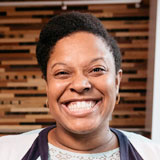Notice of Online Archive
This page is no longer being updated and remains online for informational and historical purposes only. The information is accurate as of the last page update.
For questions about page contents, contact the Communications Division.
postdoctoral fellow, biology
Ph.D., human genetics and molecular biology, Johns Hopkins School of Medicine
Graduate Certificate, Johns Hopkins School of Public Health, Health Disparities and Health Inequalities
What I focus on:
“I’m a human geneticist with a focus on health disparities and epigenetics. For the past three years I’ve been at the National Cancer Institute, where I looked at the biology of different populations with lung cancer. African Americans get and die from lung cancer more than European Americans. Everyone assumes that African Americans smoke more. But they actually smoke less. It’s a paradox. Even African Americans who are light smokers or never smokers get lung cancer more. We don’t know why. It makes us think that there might be biological changes that drive this, and that’s what I’m looking for.”
What inspired me: “When I was 12, I had a friend with sickle-cell disease. I asked my mom what that was, and she told me to look it up. That was her favorite thing to say. My mom was my first research mentor. So I called the local hospital, and I talked to an operator who connected me with the genetic counseling department. A very nice genetic counselor asked me if I wanted to come in and talk about it, so I did. And I eventually became a volunteer there. Being immersed in that environment got me very excited about a career in human genetics.”
What I’m excited about:
“I’m working with four students this semester in the IT LAB, which stands for Integrative and Translational Laboratory for Applied Biology. We are looking at these population differences in the lab, and we’re also thinking about how what we learn applies to the general public. So we will be doing education and outreach. I think it’s important for the students to understand that part of how you reduce health disparities is through educating and raising awareness in the community that we are studying. I’m also excited about teaching a precision medicine class. It works nicely with my research because I can take things that we learn from the lab into class, and the conversations we have in class sometimes give me an idea about how to approach something in the lab.”

What I’m holding:
“This is an antique microscope from 1780. My husband, who is a religious studies scholar, bought this for me while he was studying abroad in Switzerland. It was during my dissertation phase, which was a very tough time for me. I remember being very discouraged. There was this final experiment that just wasn’t working, and it was holding up my research progress. This came in the mail, and he wrote to me that someone made important discoveries with this, and that my work would lead to important discoveries that will change lives. I never forget that. The thing I love about it is that it’s not perfect. It’s missing a stage clip. And it makes me think that as a scientist, I’m not perfect, but there is still an opportunity to do good work.”
Categorized in: New Faculty

